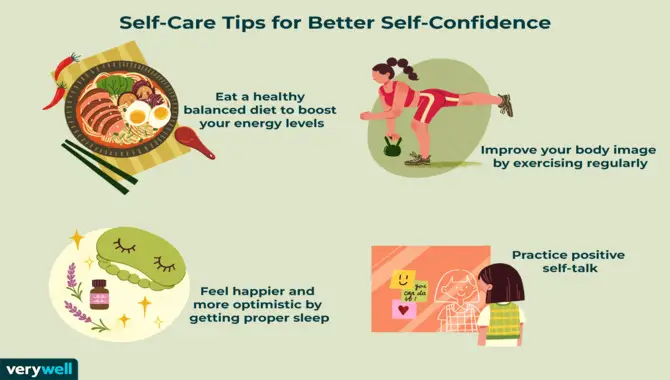Many people experience self-doubt at various points in their lives. It’s a feeling of uncertainty and lack of confidence in oneself, often triggered by fear of failure or negative self-talk. However, understanding the root causes of self-doubt can be instrumental in overcoming it. Positive affirmations and surrounding yourself with supportive individuals can also help build confidence over time.
Here we will delve into the causes and impact of self-doubt and provide tips on overcoming it and boosting your self-confidence. From practising self-compassion to challenging negative thoughts, we have got you covered. We will also discuss the importance of building self-confidence and provide you with actionable tips to help you feel more self-assured in any situation. Say goodbye to self-doubt and hello to a more confident, empowered version of yourself.

Contents
- 1 How to Overcome Self-Doubt
- 1.1 Practice Self-Compassion
- 1.2 Challenge Negative Thoughts
- 1.3 Set Realistic Goals
- 1.4 Focus on Strengths
- 1.5 Surround Yourself with Supportive People
- 1.6 Seek Professional Help If Needed
- 1.7 Building Self-Confidence
- 1.8 Understanding the Importance of Self-Confidence
- 1.9 Tips to Boost Self-Confidence
- 1.10 Why Is It Important To Overcome Self-doubt?
- 1.11 What Are The Consequences Of Not Overcoming Self-doubt?
Causes of Self-Doubt
Self-doubt can be caused by a variety of factors and experiences, such as past failures, negative feedback, fear of failure or success, comparison with others, and unrealistic expectations of oneself. These root causes can reinforce negative self-talk and low self-esteem, leading to feelings of uncertainty and a lack of confidence in one’s abilities or decisions. It is essential to understand the underlying causes of self-doubt to begin overcoming it. By challenging negative thoughts and focusing on strengths, individuals can build confidence and reduce feelings of self-doubt over time.
Past Experiences
Our past experiences, especially negative ones, can be a significant factor in generating self-doubt. Past failures or criticisms from others can leave a lasting impact on us. However, it is essential to note that those experiences do not define us. We have the power to change our mindset by practising positive affirmations and focusing on our strengths and accomplishments. It is crucial to recognize that everyone makes mistakes and has faced failures. Seeking support from friends, family, or a therapist can provide valuable insights into working through negative experiences and traumas.
Negative Feedback
Negative feedback from others can be damaging to one’s self-confidence and contribute to feelings of self-doubt. However, it is essential to understand that negative feedback is not always a reflection of one’s worth as a person. Instead, it can serve as an opportunity for growth and improvement. It’s important to focus on your strengths and accomplishments and use negative feedback as a motivating factor to work harder and achieve better results. Surrounding yourself with supportive people who uplift and encourage you can also boost your confidence levels and help you overcome self-doubt.
Fear of Failure and Success
Overcoming self-doubt is not just about addressing past experiences or negative feedback. It’s also essential to acknowledge and address fears of failure and success. Fear of failure can lead to a lack of confidence in one’s abilities, while fear of success can be caused by the pressure to maintain success or a fear of change. To overcome these fears, it’s essential to set realistic goals, practice self-care, and seek support from others. Remember that failure is an opportunity for growth and improvement, and success should be celebrated as a testament to your hard work and determination.
The Impact of Self-Doubt
Self-doubt can have a significant impact on both personal and professional growth. It can lead to negative self-talk, a lack of motivation, and missed opportunities. Recognising and challenging negative thoughts is crucial in overcoming self-doubt. Setting achievable goals, practising self-care, and seeking support from friends, family, or a therapist can also help build self-confidence. Strategies to overcome self-doubt require patience and perseverance but can be incredibly rewarding in the long run.
How to Overcome Self-Doubt

Overcoming self-doubt is a crucial step towards building self-confidence. It requires recognizing and challenging negative thoughts that contribute to self-doubt, practising self-compassion, and setting achievable goals. Focusing on personal growth and progress rather than comparing oneself to others can also help in overcoming self-doubt. Building a support system of people who believe in you and encourage you is equally important. Seeking professional help from a therapist or counsellor can be useful in identifying the root cause of self-doubt and developing strategies to overcome it.
Practice Self-Compassion
Treating yourself with kindness and understanding is an integral part of building self-confidence. Practising self-compassion can help you overcome feelings of inadequacy and build a positive self-image. To start, try writing down supportive messages to yourself, focusing on your strengths instead of perceived weaknesses, and giving yourself permission to make mistakes. These small acts of kindness towards yourself can have a significant impact on how you view yourself and your abilities. By cultivating a compassionate attitude towards yourself, you can boost your self-confidence and overcome self-doubt.
Challenge Negative Thoughts
Our thoughts play a significant role in shaping our perception of ourselves and our abilities. Negative thoughts can limit our potential and fuel self-doubt, which can be detrimental to our overall well-being. Challenging negative thoughts is an effective way to overcome self-doubt and build self-confidence.
We can break free from the cycle of self-doubt by questioning the validity of negative thoughts and reframing them into positive affirmations. Practising mindfulness and focusing on the present moment can help us quiet negative self-talk. Surrounding ourselves with positive influences, such as supportive friends or motivational content, can boost our confidence and help us overcome self-doubt.
Set Realistic Goals
Setting realistic goals is a crucial step towards overcoming self-doubt and building self-confidence. It’s important to break down larger goals into smaller, achievable steps. Celebrating milestones along the way can help you acknowledge the progress made, boosting your confidence. Additionally, focusing on personal growth rather than comparing yourself to others can reframe negative self-talk with positive affirmations. Remember that building self-confidence is a journey, not an overnight transformation, and setting achievable goals that align with your growth trajectory can help you develop this trait over time.
Focus on Strengths
Acknowledging and focusing on your strengths can be an effective way to boost self-confidence and overcome self-doubt. Identifying your innate talents and skills can help you feel more capable and competent, which in turn can lead to a greater sense of self-worth. Take the time to list your strengths and think about how you can incorporate them into your daily life, whether through work, hobbies, or personal relationships. Practising positive self-talk and reminding yourself of past successes can reinforce your belief in your abilities and help you overcome feelings of inadequacy. Remember that building self-confidence is an ongoing process, but focusing on your strengths is a powerful first step.
Surround Yourself with Supportive People
Building a support system can be crucial in overcoming self-doubt. Surrounding yourself with supportive people, who believe in you and encourage you, can help boost your confidence and see your worth. It’s important to seek out relationships that are built on trust and respect, where people are honest with you but also supportive. These individuals can provide encouragement and positive feedback when you need it the most. However, it’s equally important to avoid negative or toxic people who bring you down or make you doubt yourself further. Remember that it’s okay to ask for help and support when needed, and surrounding yourself with supportive people can make all the difference in your journey towards building self-confidence.
Seek Professional Help If Needed
When self-doubt becomes overwhelming and starts affecting your day-to-day life, professional help can be a valuable option. Seeking guidance from a therapist or counselor can provide you with the right tools to overcome self-doubt. It is crucial to choose a mental health professional who specializes in treating self-doubt or related issues and has undergone appropriate training and experience to help you tackle your concerns effectively. Remember, seeking help is a sign of strength and can lead to greater self-confidence, personal growth, and overall well-being.
Building Self-Confidence
Developing self-confidence can be a challenging task, but it’s crucial for achieving personal and professional growth. One way to build self-confidence is by identifying and challenging negative self-talk. We often tend to focus on our flaws and weaknesses, which can lead to self-doubt and limit our potential. By replacing these negative thoughts with positive affirmations, we can train ourselves to see our strengths and accomplishments more clearly. Additionally, setting realistic goals and celebrating progress along the way can help us build confidence in our abilities and boost our self-esteem. Remember, building self-confidence is a journey that requires patience, perseverance, and a commitment to self-improvement.
Understanding the Importance of Self-Confidence
Self-confidence is an essential trait that can have significant impacts on both personal and professional life. It helps cultivate a positive mindset, boosting self-esteem and encouraging you to take risks. Conversely, a lack of self-confidence can lead to anxiety, fear, and self-doubt, ultimately hindering progress and success. Building self-confidence requires conscious effort and involves practising positive affirmations, setting achievable goals, celebrating small victories, learning new skills, seeking feedback, and developing a growth mindset. By consistently working on building your confidence, you will develop the resilience needed to overcome setbacks and pursue your dreams with conviction.
Tips to Boost Self-Confidence

Fostering self-confidence can be a challenging journey, but several tips can help you along the way. Identifying and challenging negative self-talk is one of the most crucial steps in boosting your confidence levels. Setting small, achievable goals and celebrating progress can also positively impact your mindset. Additionally, practising self-care through activities like mindfulness or exercise can improve your overall well-being and contribute to greater self-assurance. Surrounding yourself with supportive people who uplift and encourage you is also critical for maintaining confidence in yourself and your abilities.
Why Is It Important To Overcome Self-doubt?

It is important to overcome self-doubt in order to achieve success.
Self-doubt is a common feeling everyone experiences at some point in their lives. It is the feeling of not being good enough or not being able to do something. Self-doubt can lead to a negative spiral of thoughts and can hold you back from reaching your full potential.
Self-doubt is normal, but it can hold you back from achieving your goals. It is important to overcome self-doubt so that you can reach your full potential. When you have self-doubt, you may start to doubt your abilities, which can lead to a negative spiral of thoughts. It is important to catch yourself when you start to have these negative thoughts and turn them around.
One way to overcome self-doubt is to practice positive self-talk. This means you positively talk to yourself and remind yourself of your strengths and abilities. It is also important to set realistic goals for yourself and to celebrate your accomplishments, no matter how small they may be.
What Are The Consequences Of Not Overcoming Self-doubt?

The consequences of not overcoming self-doubt are a life of self-imposed limitations and a constant feeling of not being good enough.
Self-doubt is a common feeling that can creep up on anyone. It’s that little voice in your head that tells you you’re not good enough, can’t do it, or will fail. If left unchecked, self-doubt can have some serious consequences.
One of the biggest consequences of not overcoming self-doubt is that it can hold you back from reaching your full potential. If you’re constantly doubting yourself, you’ll never truly be able to see what you’re capable of. You’ll always be second-guessing yourself and your abilities, and as a result, you’ll never reach your full potential.
Another consequence of not overcoming self-doubt is that it can lead to anxiety and depression. When you’re constantly doubting yourself, it takes a toll on your mental health. You may start to feel anxious and depressed and even start withdrawing from your friends and family.
If you’re struggling with self-doubt, it’s important to reach out for help. Talk to a trusted friend or family member, or see a therapist. They can help you work through your self-doubt and start to overcome it. Remember, you’re not alone in this, and there is help available.
FAQ
1.How Can You Tell If You Are Suffering From Self-doubt?
2.What Are The Causes Of Self-doubt?
3.How Can You Prevent Self-doubt From Taking Over Your Life?
4.What Are Some Resources Available To Help You Overcome Self-doubt?
Conclusion
In conclusion, self-doubt can be debilitating and hinder your growth and success. It is crucial to recognize the causes and impact of self-doubt on our lives. Overcoming self-doubt takes time, effort, and a lot of patience, but it is possible. By practicing self-compassion, challenging negative thoughts, setting realistic goals, focusing on strengths, surrounding yourself with supportive people, and seeking professional help if needed, you can overcome self-doubt and build your self-confidence.
Remember that building confidence is a lifelong process that requires consistent effort and patience. For more tips on boosting your self-confidence, check out our blog post on building confidence in yourself.
We hope this article has helped clear up any confusion you may have had about self-doubt.
Leave a Reply